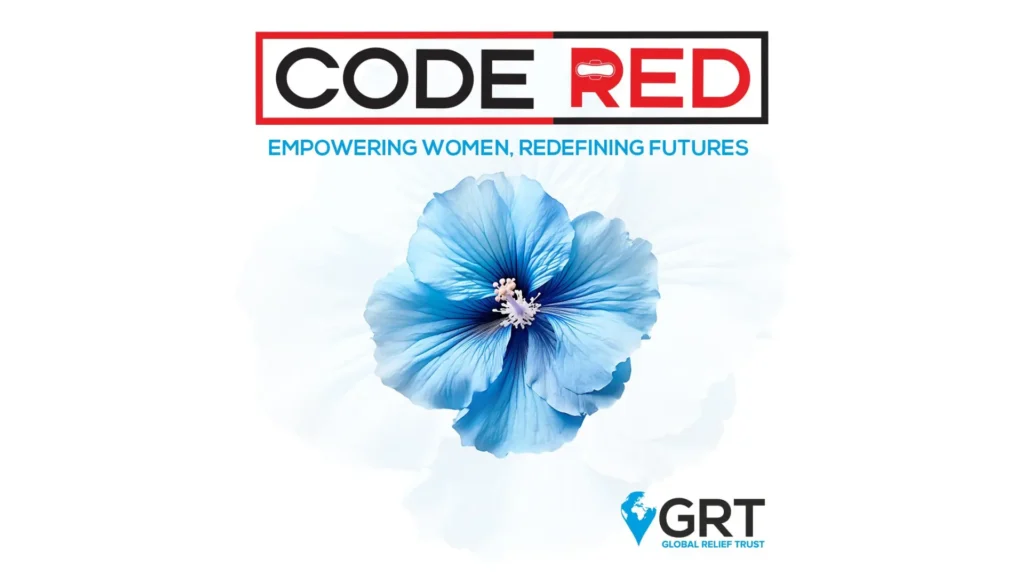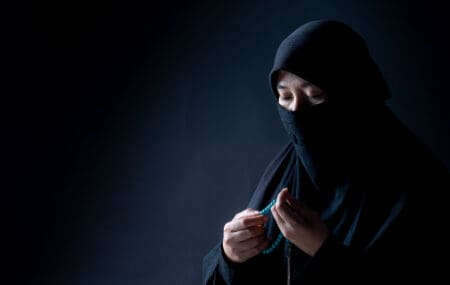
Global Relief Trust: CODE RED
Menstruation is a normal part of life, yet for millions of women, managing it is an ongoing struggle. From Gaza to communities worldwide, many women lack access to basic menstrual products, forcing them to resort to unsafe alternatives that impact their health, dignity, and well-being. In response to this humanitarian crisis, Global Relief Trust (GRT) launched CODE RED, a campaign dedicated to ending period poverty by ensuring access to menstrual products, raising awareness, and breaking the silence around menstrual health. In this article, the GRT Team uncover the vision and heart behind CODE RED.
The story so far…
COVID-19 brought the world to a standstill, and with it, we faced challenges we did not expect. The need for this initiative became evident during the COVID-19 pandemic when GRT distributed thousands of hygiene packs across the UK. However, witnessing the need for these essential items for women in the UK as a result of the lockdown in COVID-19 sparked a deeper question: If women in the UK were struggling, what about the women in the countries we work in? What do they do?
With the genocide of Gaza unfolding, we heard heartbreaking stories of our mothers, sisters and daughters struggling to find any sanitary products. They had no idea how they would cope with their periods in such dire circumstances. Often, women were left with no choice but to clean dirty clothes in the sea, lacking access to basic hygiene essentials.
When we contacted our global teams, the response was overwhelming. There was a huge demand for hygiene packs, which culminated in a positive response from both male and female donors. We began distributing hygiene packs, including menstrual products, shampoo, combs, soap, and body lotion, to give them an extra little lift during times of struggle.
Yet, with the difficulties of working in vulnerable communities and war-torn areas came the taboo and cultural sensitivities around women’s menstrual cycles. Many girls miss school every month due to a lack of access to pads or proper sanitation. Others are forced to use harmful alternatives, increasing their risk of infections. But, this could not stop us.
We knew the time to act was now. – the time to break taboos, raise awareness and give a voice to real problems women face every day.
CODE RED was born, but our journey had only started!
The term ‘CODE RED’ is used to highlight emergencies – an urgent issue affecting millions worldwide. CODE RED seeks to end period poverty by ensuring access to menstrual products, raising awareness, and breaking down stigmas around menstrual health. This campaign also advocates for individuals facing financial hardship, both locally and globally, by tackling the significant barriers they encounter in managing their health with dignity.
“Period poverty isn’t only about the inability to afford products; it’s also about confronting the silence, shame, lack of education surrounding menstruation,” says Samim Saleh Women’s Hygiene and Campaigns Lead.
At GRT, we believe in lasting solutions. That’s why we use reusable pads — a cost-effective, eco-friendly alternative. Through education, local production, and strategic partnerships, this approach empowers individuals and communities while supporting environmental sustainability.
“By combining education, local production, and partnerships, this approach brings broad benefits of empowering individuals and communities, supporting environmental sustainability and driving economic development through local manufacturing,” highlights Atiq Ur Rahma Head of Development at GRT.
Why talking about menstruation matters
As a trainee clinical psychologist pursuing a doctorate in Clinical Psychology and serving as the Mental Health and Women’s Ambassador for the Global Relief Trust (GRT), I, Rubbia, am deeply committed to starting meaningful conversations about menstruation. These discussions go beyond biology – they are about reshaping societal attitudes, dismantling harmful stigmas, and fostering both emotional and mental well-being.
Menstruation is intertwined with physical health, mental health, cultural identity, and spiritual understanding. So, by addressing menstruation holistically, we can create real change. This looks like advocating for education, access to period products, and open conversations that allow women and girls to manage their menstrual health with dignity and confidence.
Menstrual and mental health
Menstrual health and mental well-being are deeply connected, yet the stigma surrounding periods often leads to stress, anxiety, and feelings of shame. Period stigma can lead to social isolation, which affects self-esteem and increases the risk of mental health challenges. This stigma, reinforced by limited education and cultural misconceptions, creates an environment where women and girls feel shame for such a natural and vital process.
The emotional toll is compounded for those facing period poverty. The inability to access menstrual products can lead to embarrassment, absenteeism from work or school, and feelings of inadequacy. This lack of access not only perpetuates inequality but also reinforces the notion that menstruation is a problem rather than a natural and beautiful part of life.
To truly address these issues, we need open conversations, better education, and real systemic change. There is a real need for safe spaces where women and girls – especially within Muslim communities – can share their experiences and seek support. Mental health interventions that include discussions about menstruation can also help break the cycle of shame and foster resilience.
The historical significance of menstrual conversations
Discussing menstruation is not a new phenomenon; it is rooted in our history. Across cultures and centuries, menstruation has been both revered and misunderstood. While some ancient societies celebrated it as a symbol of fertility and life, others viewed it with fear and superstition. The historical marginalisation of menstrual health has had lasting consequences.
Misogyny and lack of education have perpetuated myths that menstruating women are impure or unclean. These attitudes have shaped cultural and societal norms, often restricting women’s freedom and autonomy. But, by reclaiming this narrative, we can honour the resilience of those throughout history who have challenged these taboos. This is especially important for Muslim women, who often face additional layers of stigma rooted in cultural – not religious – beliefs.
The Islamic perspective: Embracing the beauty of ḥayḍ
Islam offers a powerful framework for understanding menstruation with dignity and respect. Far from the stigma perpetuated by some cultural practices, Islamic teachings emphasise that menstruation is a natural and integral part of life.
Language profoundly influences how we perceive and experience the world. Words do not merely describe phenomena; they shape attitudes, beliefs, and cultural narratives. The Arabic word ḥayḍ, which describes menstruation, carries a profound and poetic resonance. It is derived from the concept of a current or flow, evoking imagery of water in motion, dynamic, vital, and essential for life. This linguistic association frames menstruation as an active and life-giving process, emphasising its centrality in the cycle of creation and its connection to vitality and renewal. It portrays menstruation not as a pause or interruption but as a continuation of life’s rhythm, an ongoing process that sustains humanity.
In contrast, the English term “period” conveys a markedly different perspective. Rooted in the idea of an interval or an ending, it often implies finality or limitation. This subtle linguistic framing can shape perceptions, subtly embedding the notion of menstruation as a cessation, something to be endured until it is over. While “period” functions as a practical descriptor, it lacks the inherent reverence and affirmation found in haydh , missing an opportunity to celebrate the process as one of vitality and dynamism.
This difference in linguistic framing highlights the importance of the words we choose when discussing menstruation. Positive, empowering language can dismantle stigma and foster a healthier relationship with menstrual health. By adopting terminology that celebrates the beauty and significance of menstruation, societies can reshape attitudes and build a culture of respect and dignity for this essential aspect of human life.
The Prophet Muhammad’s ﷺ actions provide profound lessons in compassion and understanding. His treatment of his wife ʿĀʾishah (may Allah be pleased with her) during her menstruation was marked by care and kindness. From drinking from the same spot on her cup to consoling her during Hajj, the Prophet ﷺ demonstrated that menstruation should not be a source of shame. These examples remind Muslim women to embrace their natural state and find ways to stay spiritually connected in every circumstance.
One such story is that of Umayyah bint Qays (may Allah be pleased with her), a young girl who began menstruating while traveling with the Prophet Muhammad ﷺ on his journey to Khaybar. Embarrassed and unsure, she tried to hide the traces of blood that had soiled the luggage behind her. The Prophet ﷺ, in his gentleness and wisdom, noticed both her discomfort and the stain. He acknowledged her situation with kindness, and later gifted her a necklace from the battle. This gesture meant so much to her that she never removed it and even requested to be buried with it. This story is a beautiful reminder of how women are encouraged to navigate their menses with confidence.
Islamic history also highlights the importance of seeking knowledge about menstruation. ‘Āʾishah praised the women of the Anṣār, for their willingness to ask questions about their faith without hesitation. Their example serves as a powerful reminder that education is key to dismantling stigma and ensuring women have the knowledge they need to practice their faith (dīn).
Global Relief Trust and the CODE RED campaign
The Global Relief Trust has taken a bold step in addressing period poverty through the CODE RED campaign. This initiative is not just about providing menstrual products; it is a call to action to end the silence, shame, and inequality surrounding menstruation.
CODE RED aims to:
- Raise awareness: The campaign highlights the struggles faced by individuals affected by period poverty, emphasising the impact on education, employment, and social participation.
- Provide resources: By fundraising and advocating for free access to menstrual products, GRT ensures that no one is denied basic menstrual health support.
- Break stigma: Encouraging open dialogue and education, CODE RED fosters a culture of understanding and support.
- Community engagement: The initiative invites individuals, schools, and businesses to organise events and fundraisers, strengthening local and global efforts.
- Sustainable solutions: GRT champions the use of reusable pads, an eco-friendly and cost-effective way to address period poverty while reducing environmental waste.
These efforts align with my mission as an ambassador to link mental health advocacy with practical solutions for menstrual equity. By addressing the systemic barriers women face, we not only improve their quality of life but also challenge the deep-seated inequalities that perpetuate stigma.
Moving forward: A collective responsibility
The journey to menstrual equity requires collective effort. By engaging in open discussions, promoting education, and supporting initiatives like CODE RED, we can challenge the deep-rooted stigma and inequalities surrounding menstruation. This is not just a women’s issue; it is a societal issue that demands systemic change.
As we move forward, let us draw inspiration from our history, faith, and the resilience of women who have fought for dignity and equality. Together, we can create a world where menstruation is recognised for what it truly is – a natural, beautiful, and integral part of life.
2025 is the year; empowering women, redefining futures. We take this journey to the next level of breaking barriers and providing sustainable reusable pads, to help period poverty NOT only abroad but in the UK!
Co-authored by Rubbia A., GRT Ambassador

